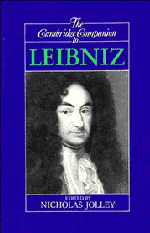Book contents
- Frontmatter
- 1 Introduction
- 2 G. W. Leibniz, life and works
- 3 The seventeenth-century intellectual background
- 4 Metaphysics: The early period to the Discourse on Metaphysics
- 5 Metaphysics: The late period
- 6 The theory of knowledge
- 7 Philosophy and logic
- 8 Philosophy and language in Leibniz
- 9 Leibniz
- 10 Leibniz's ontological and cosmological arguments
- 11 Perfection and happiness in the best possible world
- 12 Leibniz's moral philosophy
- 13 The reception of Leibniz in the eighteenth century
- Bibliography
- Index
10 - Leibniz's ontological and cosmological arguments
Published online by Cambridge University Press: 28 May 2006
- Frontmatter
- 1 Introduction
- 2 G. W. Leibniz, life and works
- 3 The seventeenth-century intellectual background
- 4 Metaphysics: The early period to the Discourse on Metaphysics
- 5 Metaphysics: The late period
- 6 The theory of knowledge
- 7 Philosophy and logic
- 8 Philosophy and language in Leibniz
- 9 Leibniz
- 10 Leibniz's ontological and cosmological arguments
- 11 Perfection and happiness in the best possible world
- 12 Leibniz's moral philosophy
- 13 The reception of Leibniz in the eighteenth century
- Bibliography
- Index
Summary
I believe. . . that almost all the methods which have been used to prove the existence of God are sound, and could serve the purpose if they were rendered complete.
(New Essays, A VI.vi: RB 438)Few philosophers today would go this far. Even in a period that has witnessed a dramatic rebirth of Anglo-American philosophical theology, the typical strategy has been to embrace a favorite proof while criticizing others or to maintain, more cautiously, that a particular argument has not been refuted. Nevertheless, while most of these philosophers reject the claim that all the classic arguments can be rendered sound, they also dismiss as passé the once prevalent view that proving God's existence is a hopeless task.
Natural theology, then, is on the rise. At such a time, it is reasonable to review the arguments of Gottfried Leibniz, one of its most distinguished proponents. Because he thought deeply about many of the issues that now absorb us, an examination of his ideas is likely to illuminate contemporary concerns.
Leibniz gives his own versions of four traditional proofs of God's existence: the ontological argument, the cosmological argument, the argument from eternal truths, and the argument from design. According to the ontological argument, God's existence follows a priori from his definition as an absolutely perfect being. Since existence is more perfect than nonexistence, the very idea of God entails that he exists. The cosmological argument, on the other hand, begins with the fact that something exists and derives the existence of God via a causal principle.
- Type
- Chapter
- Information
- The Cambridge Companion to Leibniz , pp. 353 - 381Publisher: Cambridge University PressPrint publication year: 1994
- 4
- Cited by



